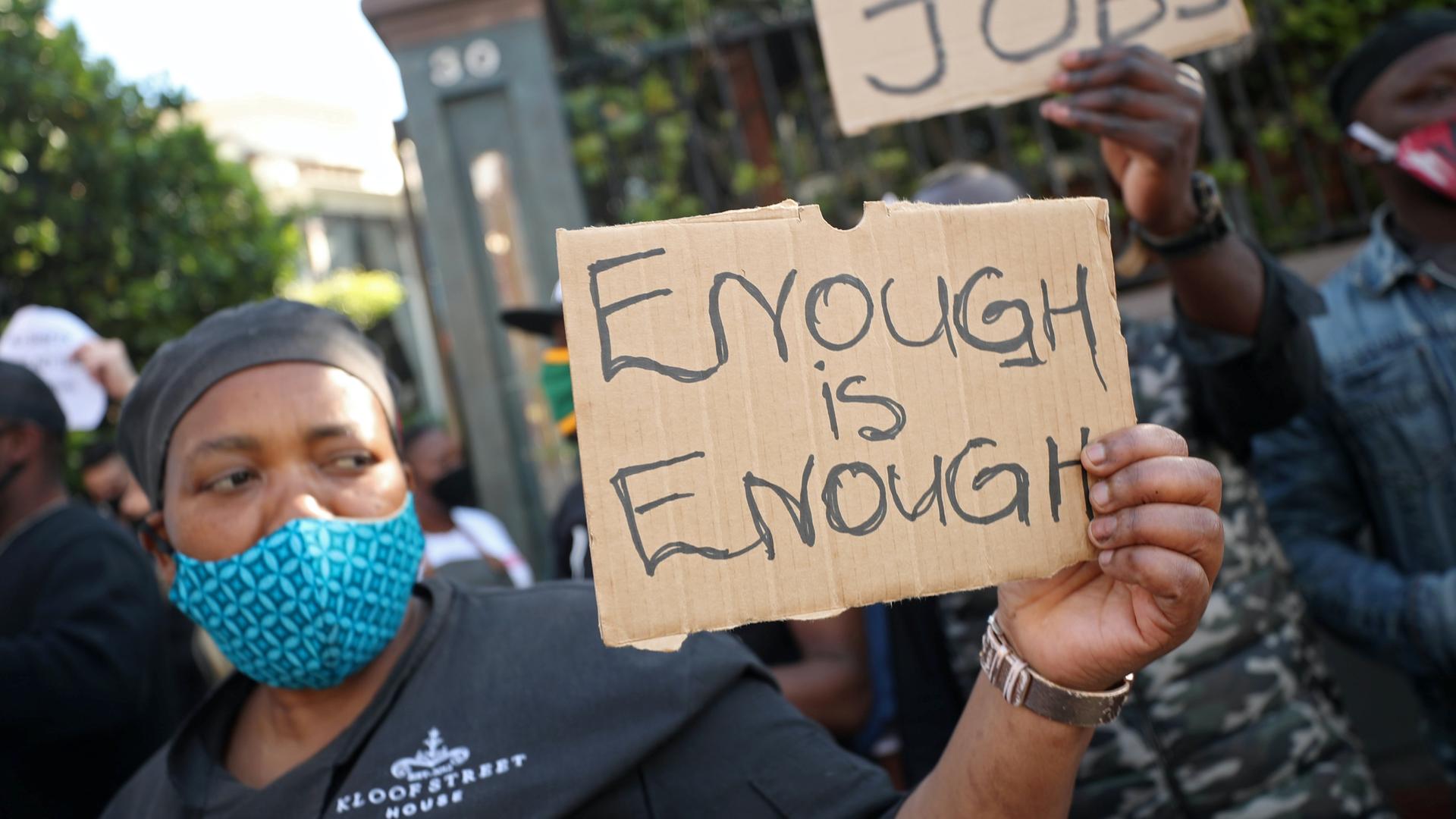COVID-19 is accelerating in Africa at an alarming rate.
South Africa had one of the strictest coronavirus lockdown measures with alcohol bans and rigid curfews in place. Now, as COVID-19 cases are rising, the government has decided to return to a strict lockdown — just as other African countries start to see a spike in cases.
The World Health Organization’s Emergencies Chief Michael Ryan expressed concern for the sub-Saharan region, warning that South Africa’s surge could signal an increase in cases across the continent.
Related: South Africa begins coronavirus vaccine trial
Thousands of South African restaurant and bar owners placed tables and chairs on the streets outside their premises on Wednesday in a nationwide protest against lockdown restrictions that prevent them from selling alcohol or trading after 9 p.m. The nation’s hospitality sector is one of the hardest-hit by government restrictions imposed at the end of March to curb the spread of the coronavirus.
Host Marco Werman spoke with Dr. John Nkengasong, the director of the Africa Centers for Disease Control and Prevention, about what may have gone wrong and how African leaders can step in now with preventative measures to curb the spread of the virus across the continent.
Related: Policymakers rush to stave off economic collapse on African continent
Marco Werman: COVID-19 cases were low, but now as South Africa and other countries have been opening back up again, we’re seeing this dangerous second surge. What happened in South Africa?
Dr. John Nkengasong: South Africa is, of course, a very disturbing situation for the continent. As we speak today, the continent of Africa, all 55 member states, have now recorded cases of COVID-19 resorting to about 846,000 [infections], and of that, more than half the cases are from South Africa. South Africa did all the right things to start with — they only had about 700 cases. The lockdown, the economy, increased testing and contact tracing. I think we know that this is a virus that transmits very quickly, and once it gets hold into very vulnerable populations, it can spread rather quickly.
There is this really fine balance that governments need to consider with lockdowns. On the one hand, science shows us these measures are keeping the coronavirus at bay. On the other, they’re having a detrimental effect on economies. Have economic problems actually aggravated public health strategies like in South Africa?
The key question here is, how do we balance between saving lives and saving the economy and not saving lives or saving economies? I think that formula cannot hold. We cannot be under lockdown forever. We have to go out there and fight the battles and intensify aggressive, bold public health measures. Taking public health measures that work in the United States, in Europe and elsewhere and implemented in Africa will not work. I think that is one. Second, is that we need to be bold in doing what we have to do. … A lot more than 40 countries in Africa still have less than 5,000 cases of COVID-19 infection. That is an opportunity where we can massively deploy foot soldiers — that is, contact tracers. I want to see a country like Nigeria put in about 1 million contact tracers, young people who can support their testing programs so that the testing delays are reduced. …[Those are the] tools that we have in our hands right now. Otherwise, I don’t know how we are going to fight this virus.
There are allegations in South Africa of corruption — vendors charging absurdly high rates for masks and hand sanitizer. How has South Africa’s history of corruption affected the response to coronavirus? And do you worry how corruption could impact other parts of the continent’s response to the crisis?
When you have an outbreak of this nature — any nature, for that matter — you see all kinds of behaviors. And I think there are people that will go in and try to exploit this situation. We saw that with HIV/AIDS and we saw that within the massive Ebola outbreak in West Africa. So the COVID-19 would not be an exception. I think we at Africa CDC and the African Union Commission are very clear that this is a serious threat for the continent. People that tried to see this as a money-making opportunity are really making a fatal mistake. And this should not at all be accepted, be tolerated and be condoned. I think it should be condemned with the strongest possible terms.
You’ve got such a massive sphere of operations and responsibilities, from the southern coast of the Mediterranean all the way down to South Africa’s Cape of Good Hope. What are you urgently advising African governments to do to keep this likely next wave of the coronavirus stabilized?
Quite honest with you — we haven’t even [gotten] done yet with the first wave. That is a place to be very frank with ourselves. I think we have to rely on the tools that we have in our toolkit. Very importantly, is that only human resources will be able to combat this. This is about investing in human capital to fight this infection in a coordinated way across the board. I fully understand the challenge, but it’s a challenge that we have to deal with, take it in our hands, look at it, and say, “This is our continent. This is our future.” And we have to win this fight in order to survive.
This interview was edited and condensed for clarity. Reuters contributed to this report.
